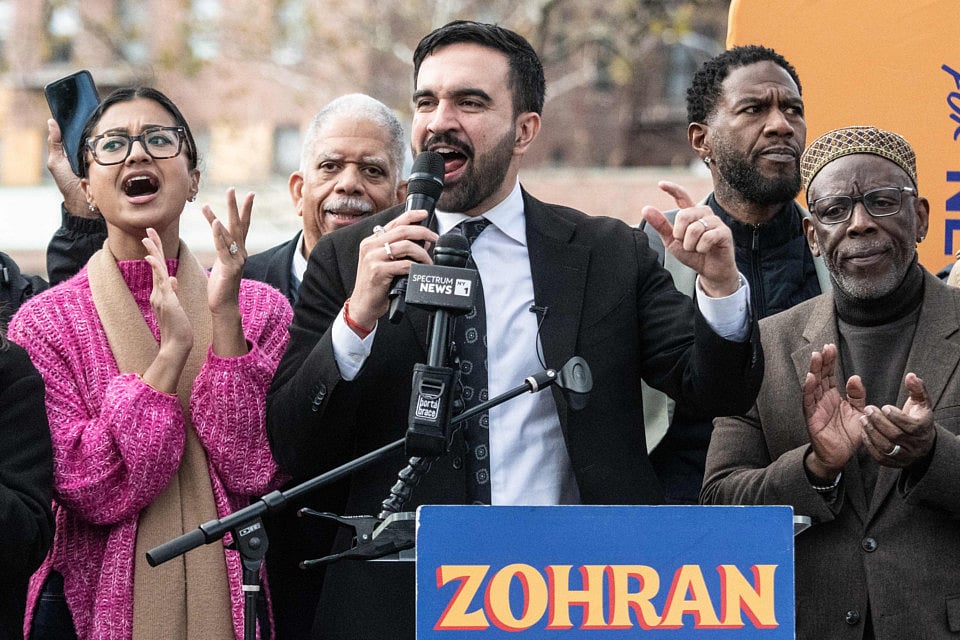How Zohran Mamdani is changing the way New Yorkers see politics
34-year-old Muslim candidate leads a grassroots movement ahead of November 4 mayoral vote

NEW YORK: The race to lead America’s largest and most diverse city has become a mirror of the country’s political and cultural divides — and a test of whether a new generation of progressive leaders can reshape power in an era still defined by Donald Trump’s influence.
At 34, Zohran Mamdani, a Muslim immigrant and democratic socialist, has upended expectations by emerging as the clear frontrunner in New York’s mayoral race. His platform of affordability, rent freezes, and universal childcare — and his outspoken advocacy for Palestinian rights — have electrified young voters while unnerving parts of the Democratic establishment.
His opponent, Andrew Cuomo, a former governor, has leaned on establishment backing and a hard-line stance on Israel, deepening the campaign’s cultural and ideological rift.
The contest has evolved into more than a city election: It reflects the struggle within the Democratic Party over identity, inclusion and the limits of dissent. Mamdani’s rise embodies the aspirations of a restless, younger electorate seeking representation and economic fairness — and the backlash it provokes in an anxious political climate. The outcome will signal whether a left-wing message rooted in multiculturalism and social equity can command power in America’s most symbolic city.
What’s new?
A generational shock: At 34, State Assemblyman Zohran Mamdani — an immigrant, Muslim and democratic socialist — parlayed a surprise June primary upset into a commanding polling lead ahead of the November 4 mayoral vote.
National spotlight: The race has drawn Donald Trump’s attention and, head of the election, a private 30-minute call from Barack Obama, who offered to be a sounding board on governing and staffing if Mamdani wins.
A polarised contest: Mamdani’s rise has sharpened a contrast with rival Andrew Cuomo, the former governor, amid attacks invoking Islamophobia and fierce arguments over Israel-Gaza.
Why does this race matter?
Policy stakes: Mamdani’s platform centres on affordability — rent freezes, free buses, and universal child care — funded by higher taxes on corporations and the wealthiest New Yorkers.
Party direction: His coalition is testing whether a left-populist economic message can win — and then govern — America’s largest, most diverse city.
National bellwether: Youth turnout and coalition breadth could preview Democratic fault lines heading into national contests.
Who is Zohran Mamdani?
Zohran Kwame Mamdani, 34, is an Indian-Ugandan-born Democratic Socialist politician representing Astoria, Queens, in the New York State Assembly.
Born in Kampala, Uganda, and raised in New York City, he is the son of Indian filmmaker Mira Nair, known for Monsoon Wedding and The Namesake, and renowned Ugandan academic Mahmood Mamdani.
Mamdani is married to Gabrielle Fialkoff, a community organizer and educator.
Before entering politics, he worked as a housing counselor and tenant organizer, focusing on eviction prevention and affordable housing.
Elected to the Assembly in 2020, he became one of New York’s first South Asian and Muslim legislators.
Now a leading candidate for mayor of New York City, Mamdani has built his campaign around affordability, public transit access, and social equity — issues he says define a fairer, more inclusive city.
The Mamdani coalition
Youth surge: Voters 18–29 posted the highest primary turnout, propelling Mamdani from long-shot to frontrunner.
Small-donor energy: The campaign relies on grassroots fundraising and tens of thousands of volunteers in the final push.
Symbolic appeal: His ascent signals a rebuke to donor-driven Democratic politics and a path for multicultural, left-of-center governance.
How New York’s Mayoral election works
1. Voting options
Election Day: Polls open 6am – 9pm on November 4.
Early voting: Runs for 9 days before Election Day.
2. Mail ballots: Accepted up to 7 days after Election Day if postmarked on time.
Paper ballots and scanners
Voters fill out a paper ballot, which is scanned electronically at the polling site.
Each machine stores a digital count and the paper record for verification.
3. Ranked-choice voting (RCV)
Voters can rank up to five candidates by preference.
If no one wins over 50% of first-choice votes, the lowest-ranked candidate is eliminated.
Their votes are redistributed based on second choices until one candidate crosses 50%.
4. Counting and certification
Unofficial results released on election night.
Absentee and provisional ballots counted in the following days.
Final certified results announced by the New York City Board of Elections about two weeks later.
The issues animating voters
Affordability
Proposals: Rent freezes on stabilised apartments, free buses, universal childcare.
Funding: Taxes on corporations and top earners.
Debate: Advocates call it overdue relief; critics question fiscal feasibility and state coordination.
Palestinian rights and Gaza
Mamdani calls the Gaza conflict a “genocide,” joining protests including one outside Senator Chuck Schumer’s home.
Supporters see moral clarity; detractors warn of division and foreign-policy overreach in a city election.
Identity, attacks and the Cuomo contrast
Islamophobia in the campaign: Cuomo-aligned backers circulated ads such as “Jihad On NYC” and shared an AI-generated video mocking Mamdani’s South Asian heritage. Cuomo’s team later called the post an error.
Cuomo’s stance: He claims Mamdani’s Israel criticism created “real fear” in Jewish communities, rejecting responsibility for supporters’ rhetoric.
Historical echo: Historians compare Andrew Cuomo’s silence today to his father Mario Cuomo’s 1977 stand against anti-gay slurs in a prior mayoral race — a sign, analysts say, of a coarsened political discourse.
Obama’s call — and what it signals
Governance prep: Obama discussed staffing, policy delivery, and capacity — a move from movement politics to municipal execution if Mamdani wins.
Party message: The outreach shows how the Democratic mainstream is divided yet cautiously engaging a new progressive wave.
Sign up for the Daily Briefing
Get the latest news and updates straight to your inbox
Network Links
GN StoreDownload our app
© Al Nisr Publishing LLC 2026. All rights reserved.
